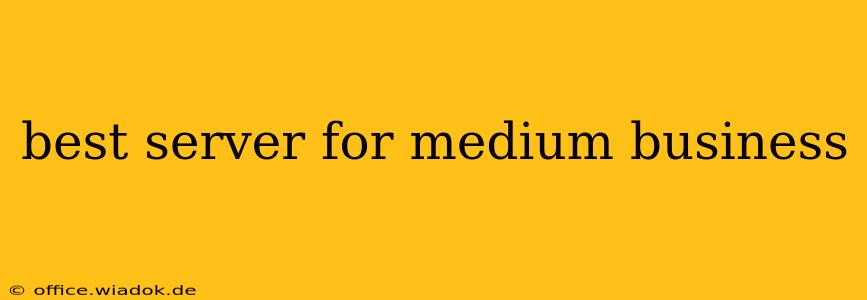Choosing the right server is crucial for a medium-sized business. The wrong choice can lead to downtime, performance bottlenecks, and ultimately, lost revenue. This comprehensive guide will help you navigate the complexities of server selection, ensuring you find the perfect fit for your specific needs and budget.
Understanding Your Needs: Before You Choose
Before diving into server specifications, take a moment to thoroughly assess your business's current and future requirements. Consider these key factors:
1. Workload and Applications:
- What applications will the server run? This is paramount. Are you running resource-intensive applications like CRM software, databases (e.g., MySQL, PostgreSQL), e-commerce platforms (Shopify, Magento), or line-of-business applications? The demands of these applications will dictate the server's processing power, memory, and storage needs.
- How many users will access the server concurrently? The more concurrent users, the more powerful your server needs to be to handle the increased load and maintain responsiveness.
- Data storage requirements: How much data do you need to store? What's your projected data growth? Will you need specialized storage like SSDs for speed or large capacity HDDs for cost-effectiveness? Consider backups and disaster recovery planning too.
2. Scalability and Future Growth:
- Anticipate your growth: Don't just choose a server that meets your current needs. Consider your projected growth over the next 2-3 years. Choosing a scalable solution will save you from costly upgrades or migrations down the line. Cloud-based solutions offer superior scalability in this regard.
- Flexibility: Will your needs change significantly in the near future? A flexible solution allows for easy adaptation to evolving business requirements.
3. Budget:
- Capital expenditure (CapEx) vs. Operational expenditure (OpEx): Consider the initial investment for purchasing a physical server versus the recurring costs associated with cloud-based solutions. Cloud computing offers predictable monthly expenses, but you don't own the hardware. Physical servers involve a larger upfront investment but offer more control.
- Maintenance and support: Factor in the costs of maintenance, repairs, and potential support contracts. Cloud providers typically handle maintenance and offer various support levels.
Types of Servers for Medium Businesses:
1. On-Premise Servers (Physical Servers):
- Pros: Greater control over hardware and software, potential for cost savings in the long run (depending on usage), and better security for highly sensitive data if properly secured.
- Cons: Requires significant upfront investment, ongoing maintenance responsibilities, and limited scalability compared to cloud solutions.
2. Cloud Servers:
- Public Cloud (AWS, Azure, Google Cloud): Highly scalable, pay-as-you-go pricing, and robust infrastructure. Ideal for businesses expecting significant growth or needing on-demand resources.
- Private Cloud: Provides more control and security than public cloud, but requires a higher initial investment. Suitable for businesses with strict regulatory compliance requirements.
- Hybrid Cloud: Combines elements of both public and private cloud, offering a balanced approach to cost, control, and scalability.
3. Managed Servers:
- Pros: Simplified management, reduced IT overhead, and expert support. A managed service provider handles server maintenance, security updates, and monitoring.
- Cons: Increased costs compared to self-managing your own server.
Choosing the Right Server: Key Specifications
Once you understand your needs, focus on these server specifications:
- CPU (Central Processing Unit): Determines processing power; more cores generally translate to better performance for multi-threaded applications.
- RAM (Random Access Memory): Crucial for application responsiveness. More RAM allows for handling more concurrent tasks and users.
- Storage: Choose between HDDs (larger capacity, lower cost) and SSDs (faster performance, higher cost). Consider RAID configurations for redundancy and data protection.
- Network Connectivity: Ensure sufficient bandwidth for your applications and users.
Conclusion: A Tailored Solution
The "best" server for your medium-sized business doesn't exist in isolation. The ideal choice depends entirely on your specific needs, budget, and future plans. Carefully analyze your requirements, compare different options, and consider consulting with an IT professional to make an informed decision. Choosing the right server is an investment that will directly impact your business's efficiency, productivity, and bottom line.

